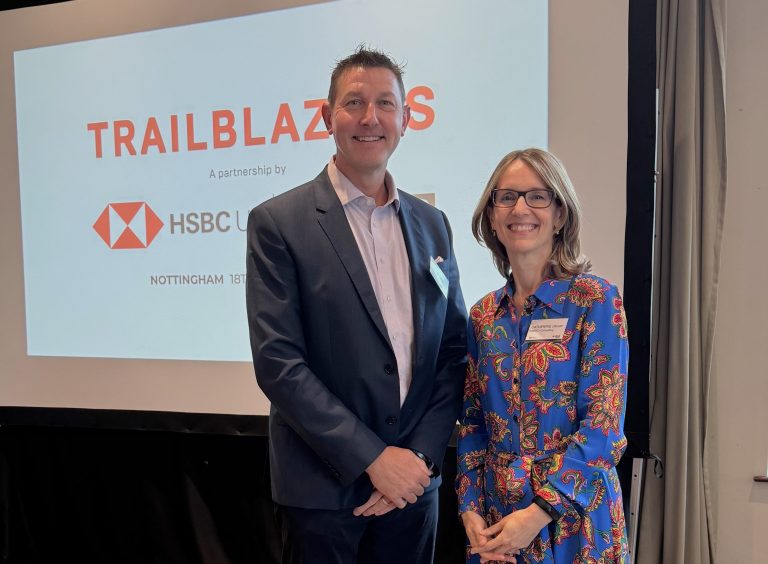Derbyshire brand consultancy to expand team after strong first 18 months
102-bedroom student development opportunity hits the market in Derby

Lincolnshire Co‑op invests £4m in outlet upgrades
Lincolnshire Co‑op has invested over £4 million in upgrading 31 of its outlets across food, funeral, pharmacy, and post office operations since launching its cyclical refresh programme one year ago.
The programme aims to modernise around 40 trading outlets each year with an annual investment of approximately £5 million. Each site undergoes a major refit every 12 years, including the replacement of equipment such as fridges and shelving. Cosmetic mid‑cycle updates take place every six years to maintain a refreshed look.
The Carlton Centre Food Store and Post Office in Lincoln received a full cyclical refresh alongside 14 other food stores and seven additional post offices, with £524,000 allocated to the upgrades. Refits also included five pharmacies, two funeral homes, and Lincolnshire Co‑op’s Louth Travel branch, the first of 13 travel agencies to be revitalised under the programme.
Upgrades reflect local community needs, with new product ranges and services added based on outlet location. Examples include frozen meals, premium coffee machines, gifting ranges, and interactive beverage offerings.
The programme is designed to strengthen customer satisfaction and loyalty while delivering operational improvements. Feedback from colleagues and customers has been incorporated to refine each refresh and support continuous enhancement across the Co‑op’s network.
Norton Nurses acquired by seasoned care provider
Norton Nurses, a domiciliary care provider in Northampton, has been sold to an established operator with extensive experience in home and residential care. The business delivers around 500 hours of care each week to 32 private clients and holds a ‘Good’ rating from the Care Quality Commission. Known locally for reliable, high-quality support, Norton Nurses has maintained consistent performance and a loyal client base.
The sale was facilitated by Redwoods Dowling Kerr, who brought the business to market as the outgoing owner retired. The transaction aimed to match the business with a buyer capable of maintaining its standards and ensuring continuity of care. The new owner assumes responsibility for upholding the service’s reputation and delivering consistent support to existing clients.
This acquisition demonstrates continued interest in well-established domiciliary care providers, particularly those with strong local reputations and stable operations. Redwoods Dowling Kerr continues to support business owners in planning exits and securing buyers aligned with the long-term success of their services.
WBR Group expands property management panel with addition of EPC Choice and Commercial Property Network
Meet the sponsors: the East Midlands Bricks Awards 2025
Meet the sponsors of the East Midlands Bricks Awards 2025
Roy Geddes Bricks – sponsor of Architects of the Year Roy Geddes Bricks (RGB) are market-leading suppliers of facing bricks, rainscreen cladding, natural stone, cast stone and bespoke precast products. With a wealth of experience and an exhaustive range of superior quality building materials and masonry supplies, they can help to create wonderful facades for all property types, no matter the size and scale of the project.
Established since 1990, RGB have built an adept and knowledgeable team who can help architects, developers, contractors and any other clients source the best suited construction materials for their project.
They take pride in their customer led approach which sees RGB strive to exceed the client’s requirements through design input, helpful product advice, value engineering, efficient procurement, logistics management and site support.
Speaking with Business Link, Alex Edmeades, Area Sales Manager, Roy Geddes Bricks, said: “Passionate about everything brick, Roy Geddes Bricks are proud to sponsor the prestigious East Midlands Bricks Awards 2025, specifically the Architects of the year.
“Architects play a vital role in shaping the identity and future of the East Midlands, blending innovation with heritage to create spaces that serve, inspire, and endure. Architecture is more than buildings—it’s about creating environments that enrich lives, strengthen communities, and reflect our shared aspirations. This award celebrates not just individual excellence, but the lasting impact great architecture has on our region and beyond. We are excited to celebrate the entrants and present the winner with their award.
“With our head office in Nottingham we know the important role the East Midlands plays in the UK construction industry. We look forward to celebrating all shortlisted companies and projects, shining a spotlight on the fantastic results this region produces year after year.”
EMEC Ecology sponsor of Contractor of the Year
Roy Geddes Bricks (RGB) are market-leading suppliers of facing bricks, rainscreen cladding, natural stone, cast stone and bespoke precast products. With a wealth of experience and an exhaustive range of superior quality building materials and masonry supplies, they can help to create wonderful facades for all property types, no matter the size and scale of the project.
Established since 1990, RGB have built an adept and knowledgeable team who can help architects, developers, contractors and any other clients source the best suited construction materials for their project.
They take pride in their customer led approach which sees RGB strive to exceed the client’s requirements through design input, helpful product advice, value engineering, efficient procurement, logistics management and site support.
Speaking with Business Link, Alex Edmeades, Area Sales Manager, Roy Geddes Bricks, said: “Passionate about everything brick, Roy Geddes Bricks are proud to sponsor the prestigious East Midlands Bricks Awards 2025, specifically the Architects of the year.
“Architects play a vital role in shaping the identity and future of the East Midlands, blending innovation with heritage to create spaces that serve, inspire, and endure. Architecture is more than buildings—it’s about creating environments that enrich lives, strengthen communities, and reflect our shared aspirations. This award celebrates not just individual excellence, but the lasting impact great architecture has on our region and beyond. We are excited to celebrate the entrants and present the winner with their award.
“With our head office in Nottingham we know the important role the East Midlands plays in the UK construction industry. We look forward to celebrating all shortlisted companies and projects, shining a spotlight on the fantastic results this region produces year after year.”
EMEC Ecology sponsor of Contractor of the Year
 EMEC is a one stop shop for specialist ecology, land management and arboriculture services. A wholly owned subsidiary of Nottinghamshire Wildlife Trust, all profits are gift aided to the Trust to support nature conservation.
Based in the heart of the East Midlands, EMEC operates for its clients throughout the UK. It serves developers, planners, architects, power and extraction industries, utility companies, local authorities, government agencies and private individuals.
Its varied portfolio of work ranges from major national research contracts and large-scale ecological impact assessments for housing and industry, through to management planning for nature reserves, bat surveys of barns and churches and habitat surveys of small-scale developments.
Speaking with Business Link, Dr Ed Tripp, Consultancy Director at EMEC, said: “We’re proud to once again sponsor the ‘Contractor of the Year’ category at the Bricks Awards, which continues to be a fantastic celebration of the region’s construction and property sectors.
“Last year’s event was a brilliant showcase of talent, innovation and collaboration, and we thoroughly enjoyed connecting with so many like-minded professionals who are helping shape the future of our built environment.
“At EMEC, we work closely with contractors across a wide range of projects, so it’s a real pleasure to help shine a spotlight on those delivering excellence on site.
“We’re looking forward to another inspiring evening.”
Devello – sponsor of Developer of the Year
EMEC is a one stop shop for specialist ecology, land management and arboriculture services. A wholly owned subsidiary of Nottinghamshire Wildlife Trust, all profits are gift aided to the Trust to support nature conservation.
Based in the heart of the East Midlands, EMEC operates for its clients throughout the UK. It serves developers, planners, architects, power and extraction industries, utility companies, local authorities, government agencies and private individuals.
Its varied portfolio of work ranges from major national research contracts and large-scale ecological impact assessments for housing and industry, through to management planning for nature reserves, bat surveys of barns and churches and habitat surveys of small-scale developments.
Speaking with Business Link, Dr Ed Tripp, Consultancy Director at EMEC, said: “We’re proud to once again sponsor the ‘Contractor of the Year’ category at the Bricks Awards, which continues to be a fantastic celebration of the region’s construction and property sectors.
“Last year’s event was a brilliant showcase of talent, innovation and collaboration, and we thoroughly enjoyed connecting with so many like-minded professionals who are helping shape the future of our built environment.
“At EMEC, we work closely with contractors across a wide range of projects, so it’s a real pleasure to help shine a spotlight on those delivering excellence on site.
“We’re looking forward to another inspiring evening.”
Devello – sponsor of Developer of the Year
 Devello Group is a specialist planning and property development practice with offices in Nottingham and Lincoln, founded by experienced lawyers Shruti Trivedi and Iain Hibbert. Their niche law firm helps clients with a wide range of services in the sector, operating with a bespoke, value-led approach that does not use a traditional hourly fee-paying model.
Speaking with Business Link, Shruti Trivedi said: “We are delighted to again be supporting the Bricks Awards with other notable local businesses. Last year’s event was invaluable in helping to establish our new company amongst our peers who share our vision of providing outstanding client service in a forward-thinking, innovative manner.
“We are looking forward to catching up with our co-sponsors, last year’s winners and this year’s nominees at the 2025 Bricks Awards, to celebrate those within the industry who are making a notable contribution and delivering exceptional results.”
Knapton Wright – sponsor of Most Active Agent
Devello Group is a specialist planning and property development practice with offices in Nottingham and Lincoln, founded by experienced lawyers Shruti Trivedi and Iain Hibbert. Their niche law firm helps clients with a wide range of services in the sector, operating with a bespoke, value-led approach that does not use a traditional hourly fee-paying model.
Speaking with Business Link, Shruti Trivedi said: “We are delighted to again be supporting the Bricks Awards with other notable local businesses. Last year’s event was invaluable in helping to establish our new company amongst our peers who share our vision of providing outstanding client service in a forward-thinking, innovative manner.
“We are looking forward to catching up with our co-sponsors, last year’s winners and this year’s nominees at the 2025 Bricks Awards, to celebrate those within the industry who are making a notable contribution and delivering exceptional results.”
Knapton Wright – sponsor of Most Active Agent
 Knapton Wright is a marketing agency that works with brands that put people and the planet first. Whether you are aspiring to be better and do better, are already stuck into your sustainability journey but could be better at shouting about it, or need expert input on what step to take next, the team can support you with all of it.
From heritage projects to sustainable development and renewables, the Knapton Wright team loves getting stuck into creating marketing that demonstrates the awesome work you’re doing.
Alex Wright, Co-Founder and Managing Director of Knapton Wright, said: “As an agency that works with brands who put people and the planet first, sponsoring a category in the East Midlands Bricks Awards 2025 – which is working to regionally recognise a sector that is increasingly emphasising the importance of sustainability across the board – was a natural choice for us.
“Property and construction as a sector keeps the business world moving, often quite literally and provides essential expertise for businesses of all shapes and sizes. After years spent studying architecture and the built environment at The Bartlett, I’m always keen to support those doing great things in the industry.
“As a creative agency, we love people who make a difference, bring great energy and make stuff happen. And, having worked with a handful of agents over the past few years, we’ve seen firsthand the time, knowledge and effort that goes into being a trusted partner for businesses looking for premises. In a time when the economy is feeling the pinch, it’s fantastic to see commercial agents being creative, innovative and recognising that first-class service is essential to ongoing success.
“The team are looking forward to catching up with existing contacts and making new connections with the cream of the property and construction sectors at Trent Bridge in October, what a venue! It’ll be interesting to see which businesses are crowned category winners in what we know is a very competitive space.”
Frank Key – sponsor of Deal of the Year
Knapton Wright is a marketing agency that works with brands that put people and the planet first. Whether you are aspiring to be better and do better, are already stuck into your sustainability journey but could be better at shouting about it, or need expert input on what step to take next, the team can support you with all of it.
From heritage projects to sustainable development and renewables, the Knapton Wright team loves getting stuck into creating marketing that demonstrates the awesome work you’re doing.
Alex Wright, Co-Founder and Managing Director of Knapton Wright, said: “As an agency that works with brands who put people and the planet first, sponsoring a category in the East Midlands Bricks Awards 2025 – which is working to regionally recognise a sector that is increasingly emphasising the importance of sustainability across the board – was a natural choice for us.
“Property and construction as a sector keeps the business world moving, often quite literally and provides essential expertise for businesses of all shapes and sizes. After years spent studying architecture and the built environment at The Bartlett, I’m always keen to support those doing great things in the industry.
“As a creative agency, we love people who make a difference, bring great energy and make stuff happen. And, having worked with a handful of agents over the past few years, we’ve seen firsthand the time, knowledge and effort that goes into being a trusted partner for businesses looking for premises. In a time when the economy is feeling the pinch, it’s fantastic to see commercial agents being creative, innovative and recognising that first-class service is essential to ongoing success.
“The team are looking forward to catching up with existing contacts and making new connections with the cream of the property and construction sectors at Trent Bridge in October, what a venue! It’ll be interesting to see which businesses are crowned category winners in what we know is a very competitive space.”
Frank Key – sponsor of Deal of the Year
 Since 1907 Frank Key has been renowned for supplying market-leading building, plumbing and timber materials. Built on family values, the business has grown to stock interiors, landscaping, civils and drainage products, as well as providing high-quality plant and tool hire equipment, making Frank Key a true one-stop shop for all your project requirements.
Frank Key’s reputation is not only built on the wide range of products sold, but how it does business. Given its experience within the industry and with many of the Frank Key team being long-standing members of staff, the firm is in the best position to provide you with the expert advice and service you need. Frank Key will order non-stocked items, stick to delivery dates and honour agreements.
Speaking with Business Link, Ben Sansom, Group Sales & Marketing Director at Frank Key, said: “Frank Key is delighted to sponsor the East Midlands Bricks Awards 2025.
“With over 110 years of experience supplying the building trade, we are proud to support an event that celebrates the incredible achievements in the property and construction sectors across our region. We wish all the nominees the very best of luck and look forward to seeing the innovative projects shaping the East Midlands.”
Build Manager – sponsor of Residential Development of the Year
Since 1907 Frank Key has been renowned for supplying market-leading building, plumbing and timber materials. Built on family values, the business has grown to stock interiors, landscaping, civils and drainage products, as well as providing high-quality plant and tool hire equipment, making Frank Key a true one-stop shop for all your project requirements.
Frank Key’s reputation is not only built on the wide range of products sold, but how it does business. Given its experience within the industry and with many of the Frank Key team being long-standing members of staff, the firm is in the best position to provide you with the expert advice and service you need. Frank Key will order non-stocked items, stick to delivery dates and honour agreements.
Speaking with Business Link, Ben Sansom, Group Sales & Marketing Director at Frank Key, said: “Frank Key is delighted to sponsor the East Midlands Bricks Awards 2025.
“With over 110 years of experience supplying the building trade, we are proud to support an event that celebrates the incredible achievements in the property and construction sectors across our region. We wish all the nominees the very best of luck and look forward to seeing the innovative projects shaping the East Midlands.”
Build Manager – sponsor of Residential Development of the Year
 With a mission to make the building process as seamless and efficient as possible, Build Manager offer comprehensive services to help you navigate the complexities of your construction project. Whether you’re planning a commercial new build, a refurbishment, or a housing development project, Build Manager are there to guide you through every step of the process, ensuring that your vision becomes a reality.
Speaking with Business Link, Matthew Jones, Director at Build Manager, said: “We are delighted to sponsor this year’s East Midlands Bricks Awards and to champion the Residential Development of the Year category.
“At Build Manager, we bring over 50 years of combined industry experience to every project, offering a comprehensive suite of services, from construction consultancy and project management, supporting SME developers with project viability and finance process, through to full turn-key design and build solutions.
“Our team, comprising former senior managers from one of Lincolnshire’s largest main contractors, provides the expertise and professionalism of a major firm, while delivering a friendly and personalised service our clients can rely on.
“The Bricks Awards are a celebration of the people and projects shaping the East Midlands, and that resonates strongly with us. We’ve chosen to sponsor Residential Development of the Year because we understand the challenges and opportunities in this space, and we’re passionate about recognising innovation, quality, and the commitment it takes to deliver homes that meet the needs of growing communities.
“We look forward to an evening of acknowledging outstanding achievements, connecting with fellow professionals, and sharing insights that contribute to the growth and success of the East Midlands construction community.”
Global HSE Group – sponsor of Commercial Development of the Year
With a mission to make the building process as seamless and efficient as possible, Build Manager offer comprehensive services to help you navigate the complexities of your construction project. Whether you’re planning a commercial new build, a refurbishment, or a housing development project, Build Manager are there to guide you through every step of the process, ensuring that your vision becomes a reality.
Speaking with Business Link, Matthew Jones, Director at Build Manager, said: “We are delighted to sponsor this year’s East Midlands Bricks Awards and to champion the Residential Development of the Year category.
“At Build Manager, we bring over 50 years of combined industry experience to every project, offering a comprehensive suite of services, from construction consultancy and project management, supporting SME developers with project viability and finance process, through to full turn-key design and build solutions.
“Our team, comprising former senior managers from one of Lincolnshire’s largest main contractors, provides the expertise and professionalism of a major firm, while delivering a friendly and personalised service our clients can rely on.
“The Bricks Awards are a celebration of the people and projects shaping the East Midlands, and that resonates strongly with us. We’ve chosen to sponsor Residential Development of the Year because we understand the challenges and opportunities in this space, and we’re passionate about recognising innovation, quality, and the commitment it takes to deliver homes that meet the needs of growing communities.
“We look forward to an evening of acknowledging outstanding achievements, connecting with fellow professionals, and sharing insights that contribute to the growth and success of the East Midlands construction community.”
Global HSE Group – sponsor of Commercial Development of the Year
 Global HSE Group are industry leaders in comprehensive fire safety, specialising in passive fire protection and technical fire consultancy, as well as delivering sustainability and MEP (building services), and their own in-house training academy.
Operating nationally across the UK and Ireland, clients include some of the UK’s leading student accommodation providers, hotels, universities, consultants, architects, and developers. They also support several of the UK’s largest housing associations, councils, and public sector organisations.
Global HSE Group place people and compliance at the heart of everything they do and pride themselves on their highly knowledgeable and experienced, multi-disciplinary team who work seamlessly to deliver safer buildings right across the UK.
Speaking with Business Link, Andrew Cooper, Managing Director at Global HSE Group, said: “We’re really proud to be returning as a sponsor of the East Midlands Bricks Awards 2025, once again sponsoring the ‘Commercial Development of the Year’ category. Last year’s event was a brilliant celebration of the region’s property and construction talent, and it was fantastic to see so many inspiring projects and passionate people under one roof.
“Sponsoring this category for the second-year running was an easy decision for us. At Global, we’re committed to supporting excellence in property and construction, and the East Midlands Bricks Awards is a perfect platform to do that.”
Viridis – sponsor of Sustainable Development of the Year
Global HSE Group are industry leaders in comprehensive fire safety, specialising in passive fire protection and technical fire consultancy, as well as delivering sustainability and MEP (building services), and their own in-house training academy.
Operating nationally across the UK and Ireland, clients include some of the UK’s leading student accommodation providers, hotels, universities, consultants, architects, and developers. They also support several of the UK’s largest housing associations, councils, and public sector organisations.
Global HSE Group place people and compliance at the heart of everything they do and pride themselves on their highly knowledgeable and experienced, multi-disciplinary team who work seamlessly to deliver safer buildings right across the UK.
Speaking with Business Link, Andrew Cooper, Managing Director at Global HSE Group, said: “We’re really proud to be returning as a sponsor of the East Midlands Bricks Awards 2025, once again sponsoring the ‘Commercial Development of the Year’ category. Last year’s event was a brilliant celebration of the region’s property and construction talent, and it was fantastic to see so many inspiring projects and passionate people under one roof.
“Sponsoring this category for the second-year running was an easy decision for us. At Global, we’re committed to supporting excellence in property and construction, and the East Midlands Bricks Awards is a perfect platform to do that.”
Viridis – sponsor of Sustainable Development of the Year
 Growing your business by building greener, Viridis are experts in providing sustainable passive environmental building services solutions incorporating renewable, low carbon, low energy, H.V.A.C, M.E.P, systems for the built environment whilst meeting client’s aspirations, helping you create sustainable, appealing and cost-effective buildings on the journey to Net Zero.
Speaking with Business Link, a spokesperson for Viridis Building Services Ltd said: “We’re proud to once again sponsor the Sustainable Development of the Year award at the Bricks Awards. At Viridis Building Services, sustainability isn’t just a buzzword – it’s the foundation of everything we do, which is why we are so passionate about sponsoring this particular award.
“Last year’s event was a fantastic showcase of innovation, collaboration and local talent, and it was inspiring to see so many projects delivering real, measurable impacts, having positive impacts on local social aspects, the environment and the local economy. We believe that building sustainably should also mean building smart, achieving environmental excellence without excessive cost, and this is what we saw last year.
“This year, we’re especially looking forward to reviewing and understanding the amazing projects completed and in the pipeline, which promote sustainability in its greatest form. It allows opportunity for connecting with like-minded professionals, celebrating the power of local collaboration, and shining a spotlight on those who are pushing boundaries in sustainable design and construction.”
Konsileo – sponsor of Excellence in Design
Growing your business by building greener, Viridis are experts in providing sustainable passive environmental building services solutions incorporating renewable, low carbon, low energy, H.V.A.C, M.E.P, systems for the built environment whilst meeting client’s aspirations, helping you create sustainable, appealing and cost-effective buildings on the journey to Net Zero.
Speaking with Business Link, a spokesperson for Viridis Building Services Ltd said: “We’re proud to once again sponsor the Sustainable Development of the Year award at the Bricks Awards. At Viridis Building Services, sustainability isn’t just a buzzword – it’s the foundation of everything we do, which is why we are so passionate about sponsoring this particular award.
“Last year’s event was a fantastic showcase of innovation, collaboration and local talent, and it was inspiring to see so many projects delivering real, measurable impacts, having positive impacts on local social aspects, the environment and the local economy. We believe that building sustainably should also mean building smart, achieving environmental excellence without excessive cost, and this is what we saw last year.
“This year, we’re especially looking forward to reviewing and understanding the amazing projects completed and in the pipeline, which promote sustainability in its greatest form. It allows opportunity for connecting with like-minded professionals, celebrating the power of local collaboration, and shining a spotlight on those who are pushing boundaries in sustainable design and construction.”
Konsileo – sponsor of Excellence in Design
 Konsileo, an independent whole-of-market insurance broker, combines state-of-the-art insurtech systems with a unique teal management model. This approach enables brokers to offer clients the very best of both worlds: competitive pricing powered by technology, and highly personal, face-to-face service grounded in deep sector expertise.
With over 30 years of specialist experience advising developers, contractors, property investors and professionals on all aspects of risk and insurance, Nick Taylor-Ward ACII, Chartered Insurance Broker and Client Director at Konsileo, who is backing the event, has built a reputation for delivering trusted guidance and tailored protection.
Speaking with Business Link, Nick Taylor-Ward said: “Supporting Bricks 2025 is a natural fit. It’s a fantastic opportunity to celebrate the strength of the region’s property and construction community, while highlighting the importance of risk management in ensuring sustainable growth and success.”
Wright Vigar – sponsor of Responsible Business
Konsileo, an independent whole-of-market insurance broker, combines state-of-the-art insurtech systems with a unique teal management model. This approach enables brokers to offer clients the very best of both worlds: competitive pricing powered by technology, and highly personal, face-to-face service grounded in deep sector expertise.
With over 30 years of specialist experience advising developers, contractors, property investors and professionals on all aspects of risk and insurance, Nick Taylor-Ward ACII, Chartered Insurance Broker and Client Director at Konsileo, who is backing the event, has built a reputation for delivering trusted guidance and tailored protection.
Speaking with Business Link, Nick Taylor-Ward said: “Supporting Bricks 2025 is a natural fit. It’s a fantastic opportunity to celebrate the strength of the region’s property and construction community, while highlighting the importance of risk management in ensuring sustainable growth and success.”
Wright Vigar – sponsor of Responsible Business
 Wright Vigar is a forward-thinking independent firm of chartered accountants and business advisers, offering a full range of services to support clients at every stage of their journey. With a growing presence in Nottingham, they combine the depth of expertise found in larger firms with the personal, friendly approach of a local practice.
What sets Wright Vigar apart is their commitment to building genuine relationships with clients, taking the time to understand their goals and helping them thrive with tailored, proactive advice.
Speaking with Business Link, Tom Maxwell, Marketing Manager at Wright Vigar, said: “We’re proud to be sponsoring the Responsible Business category at this year’s Bricks Awards. Supporting this initiative reflects our belief that long-term success in business goes hand-in-hand with integrity, sustainability, and community impact.
“We’re looking forward to celebrating the outstanding achievements of property and construction professionals across the region.”
SEV – sponsor of Overall Winner
Wright Vigar is a forward-thinking independent firm of chartered accountants and business advisers, offering a full range of services to support clients at every stage of their journey. With a growing presence in Nottingham, they combine the depth of expertise found in larger firms with the personal, friendly approach of a local practice.
What sets Wright Vigar apart is their commitment to building genuine relationships with clients, taking the time to understand their goals and helping them thrive with tailored, proactive advice.
Speaking with Business Link, Tom Maxwell, Marketing Manager at Wright Vigar, said: “We’re proud to be sponsoring the Responsible Business category at this year’s Bricks Awards. Supporting this initiative reflects our belief that long-term success in business goes hand-in-hand with integrity, sustainability, and community impact.
“We’re looking forward to celebrating the outstanding achievements of property and construction professionals across the region.”
SEV – sponsor of Overall Winner
 SEV is a leading bespoke joinery manufacturer based in Nottingham, delivering exceptional craftsmanship and tailored solutions to the commercial, retail and residential sectors across the UK. Established in 1997, the business has built a strong reputation for quality, reliability, and collaborative working, making it a trusted partner for designers, contractors, and developers alike.
Operating from its modern manufacturing facility, SEV offers a full end-to-end service — from design support and technical detailing through to precision manufacturing, finishing, and installation. Highly skilled craftsmen and project managers work closely with clients to bring your creative concepts to life, whether it’s a flagship retail fit-out, executive apartments, or high-specification residential joinery.
Speaking with Business Link, Gary Pearce, Managing Director at SEV, said: “We’re proud to be sponsoring the East Midlands Bricks Awards 2025. As a company committed to supporting sustainable growth and delivering innovative energy and infrastructure solutions, SEV is excited to celebrate the organisations and individuals shaping the future of the East Midlands’ built environment.
“The Bricks Awards are a fantastic platform to recognise the remarkable work happening across the region — from transformative developments to outstanding community projects. We’re particularly looking forward to connecting with like-minded professionals and celebrating the ingenuity and impact of this year’s finalists.”
Wood Moore & Co – Drinks sponsor
SEV is a leading bespoke joinery manufacturer based in Nottingham, delivering exceptional craftsmanship and tailored solutions to the commercial, retail and residential sectors across the UK. Established in 1997, the business has built a strong reputation for quality, reliability, and collaborative working, making it a trusted partner for designers, contractors, and developers alike.
Operating from its modern manufacturing facility, SEV offers a full end-to-end service — from design support and technical detailing through to precision manufacturing, finishing, and installation. Highly skilled craftsmen and project managers work closely with clients to bring your creative concepts to life, whether it’s a flagship retail fit-out, executive apartments, or high-specification residential joinery.
Speaking with Business Link, Gary Pearce, Managing Director at SEV, said: “We’re proud to be sponsoring the East Midlands Bricks Awards 2025. As a company committed to supporting sustainable growth and delivering innovative energy and infrastructure solutions, SEV is excited to celebrate the organisations and individuals shaping the future of the East Midlands’ built environment.
“The Bricks Awards are a fantastic platform to recognise the remarkable work happening across the region — from transformative developments to outstanding community projects. We’re particularly looking forward to connecting with like-minded professionals and celebrating the ingenuity and impact of this year’s finalists.”
Wood Moore & Co – Drinks sponsor
 Established more than 20 years ago, with offices in the East Midlands, Wood Moore & Co is a multi-disciplined practice with integrated expertise in the commercial estate agency, property management and professional service sectors.
Speaking with Business Link, Jasper Caudwell, Director at Wood Moore & Co, said: “Wood Moore & Co is delighted to be able to sponsor this year’s East Midlands Bricks Awards.
“It’s a fantastic event that recognises the accomplishments of businesses and stand out individuals from across the region. As a past winner here, I’m really looking forward to congratulating this year’s winners on their fantastic achievements.”
Established more than 20 years ago, with offices in the East Midlands, Wood Moore & Co is a multi-disciplined practice with integrated expertise in the commercial estate agency, property management and professional service sectors.
Speaking with Business Link, Jasper Caudwell, Director at Wood Moore & Co, said: “Wood Moore & Co is delighted to be able to sponsor this year’s East Midlands Bricks Awards.
“It’s a fantastic event that recognises the accomplishments of businesses and stand out individuals from across the region. As a past winner here, I’m really looking forward to congratulating this year’s winners on their fantastic achievements.”
Tickets can be booked for the East Midlands Bricks Awards 2025 here.
The East Midlands Bricks Awards 2025
What: The East Midlands Bricks Awards 2025 When: Thursday 2nd October (4.30pm – 7.30pm) Where: Derek Randall Suite, Trent Bridge Cricket Ground, Nottingham. Limited parking available onsite with additional free parking at Notts Sports Ground. Keynote speaker: Councillor Nadine Peatfield – Leader of Derby City Council, Cabinet Member for City Centre, Regeneration, Strategy and Policy, and Deputy Mayor of the East Midlands Tickets: Available here Dress code: Standard business attireMonthly corporate insolvency figures decrease, but economic instability remains
Henry Boot Construction sold to company formed by management team
Henry Boot has agreed to sell Henry Boot Construction (HBC) to PWS Construction Limited (PWS), a company newly formed by the HBC management team, for an initial consideration of £4m. The transaction also provides for additional payments to Henry Boot in the future based on certain performance criteria.
Under PWS ownership, the business will be known as HBC Construction Group. The transaction will offer HBC management greater autonomy to diversify and expand the order book as well as enhance HBC’s position in the construction market, than would be possible if the business remained within Henry Boot.
The deal allows Henry Boot to focus on its strategic priority areas of high quality land, prime property development and premium homes. Henry Boot noted that HBC is not part of the group’s medium term growth strategy and has made only a small contribution to profits. The transaction will also simplify the group’s structure and investment case.
During the year ended 31 December 2024, HBC generated £49.7m of revenue with an operating loss of £2.7m in the consolidated financial statements of the group. Following significant restructuring undertaken, including the appointment of the new management team, and with 94% of this year’s order book secured, it is expected the business should break even for FY 25.
HBC has extensive experience in both the public and private sectors, including major projects such as the £200m regeneration of Barnsley town centre, and The Cocoa Works, a £57m residential development in York.
Tim Roberts, CEO at Henry Boot, said: “The sale of HBC which we are announcing today allows Henry Boot to further its strategic focus on high quality land, prime property development and premium homes. It also enhances prospects for long term growth with a more focussed portfolio of activities with greater synergies.
“While HBC’s contribution to the group is relatively small, it is a well established business with a strong track record of delivery and an excellent management team and we wish them well for the future.“
Sainsbury’s to launch new Nottingham convenience store
Sainsbury’s is set to open a 9,118 sq ft convenience store at Fanum House, 484 Derby Road, Nottingham. The two-storey property has been fully fitted out for the retailer and includes substantial on-site parking.
The building is positioned on Derby Road, a major route in Nottingham, close to the University of Nottingham’s Jubilee Campus, the Queen’s Medical Centre, and surrounding residential areas. Its location is expected to serve students, residents, and commuters.
The letting was brokered by NG Chartered Surveyors on behalf of the landlord. Colliers acted for Sainsbury’s in the deal. The store is expected to create local employment opportunities and expand grocery access in the area.
The deal highlights the ongoing demand for prime retail and roadside properties in Nottingham, particularly in locations with strong visibility, excellent transport links, and easy community access.
East Midlands Airport to expand passenger and cargo services
East Midlands Airport is planning to increase both passenger and cargo flights, with upgrades aimed at improving connectivity and service offerings. Discussions are underway with airlines to establish links to major European hubs, allowing passengers to reach further destinations without travelling to airports elsewhere in the UK.
The airport currently serves approximately 70 destinations across Europe and North Africa, with seasonal increases during peak periods such as summer holidays. Expansion plans focus on year-round flight options, targeting both leisure and business travellers. The initiative aims to enhance regional access, providing more flexible travel opportunities outside traditional peak seasons.
Cargo operations will also see growth, building on East Midlands Airport’s position as the UK’s leading express air freight hub. Its central location offers strategic advantages for connecting Europe, Africa, and the US, supporting businesses in the region that rely on fast and reliable air logistics.
The airport’s development strategy prioritises collaboration with local businesses and authorities to align new routes and services with regional demand, ensuring both passenger convenience and commercial efficiency.
Chesterfield to inspire next generation of engineers and innovators
Promethean Particles named a 2025 WIRED Trailblazer
Derbyshire high street regeneration set for 2026 start
Plans to overhaul Long Eaton’s High Street, delayed from a September 2025 start, are now scheduled to begin in May 2026, with completion expected by May 2027. The £10 million project is part of a wider regeneration programme funded through a £25 million government grant.
Erewash Borough Council reported that delays stemmed from cost challenges raised by the design and build contractor. The scheme aims to modernise the town centre, enhancing public spaces and infrastructure.
Other projects within the regeneration programme include the Britannia Mills Bridge, which will expand pedestrian and cycling access. Work on the bridge is set to start in November 2025 and finish by June 2026. Construction on the Broad Street Bridge has also been rescheduled to begin in November 2025, with completion expected in August 2026.
The developments form part of a coordinated investment strategy to improve connectivity and public amenities across Long Eaton, supporting long-term economic growth and urban renewal.
Plans approved for 18 affordable homes on former care site
West Northamptonshire Council has approved a development to convert a former care home in Ecton Brook, Northampton, into 18 affordable homes. The scheme will provide 12 homes for social rent and six for shared ownership, addressing a local shortfall in affordable housing.
Site preparation is underway, with demolition and asbestos removal supported by a £200,000 grant from the Government’s Brownfield Land Release Fund. Construction is expected to start after a procurement process later this year, with completion projected for spring 2027.
The development will incorporate sustainable features, including air source heat pumps and electric vehicle charging points, aimed at reducing energy costs for residents and limiting environmental impact. Funding will combine Homes England grants, Housing Revenue Account borrowing, and a reduced land transfer from the Council to maintain long-term affordability.
The project forms part of the Council’s Affordable Homes Delivery Plan, which seeks to provide more genuinely affordable housing in West Northamptonshire, where demand exceeds 1,000 homes per year.
This initiative repurposes a disused site into modern, energy-efficient homes, prioritising households in need while contributing to broader local housing targets.
Private equity firm invests in Leicester corporate events agency
Fusion technology company acquires Leicester firm
Profit warning for Van Elle as challenging trading conditions continue
A profit warning has been given by Van Elle, the Nottinghamshire ground engineering contractor.
Providing a update for the year ending 30 April 2026 (FY26), the business detailed how challenging trading conditions experienced last year have continued.
Expected improvement across the firm’s core sectors “is yet to materialise,” which has been attributed to spending constraints and delays to contract starts across all sectors, particularly related to Building Safety Act (BSA) approvals for high-rise residential buildings.
Due to these factors, year to date revenues have not increased as expected and as a result, full year trading and profitability is anticipated to be materially below market expectations, and below the prior year.
Van Elle said, however, that the medium-term outlook “remains very positive,” with significant opportunities in the growing energy and water sectors, “where good early progress is being made.”
Rolls-Royce to lead new clean aviation project
Alan Newby, director of research and technology, Rolls-Royce, said: “We are delighted that Rolls-Royce has been selected to lead the UNIFIED project. This recognition underscores once again our commitment to reshape aviation and further reduce its environmental impact.
Freeths reveals record financial results
New medical centre planned for Enderby
Plans have been submitted to Blaby District Council for a new medical centre and pharmacy in Enderby. The proposed development on George Street would be located less than 100 metres from the current Shortridge Lane facility.
Developer One Medical Property intends to construct the building and lease it to Enderby Medical Centre. The centre is designed to include 13 treatment rooms, with a capacity to serve around 12,000 patients.
The current premises have reached capacity, prompting the need for expanded facilities. The new centre aims to improve accessibility, accommodate the growing local population, and provide a broader range of healthcare services.






















